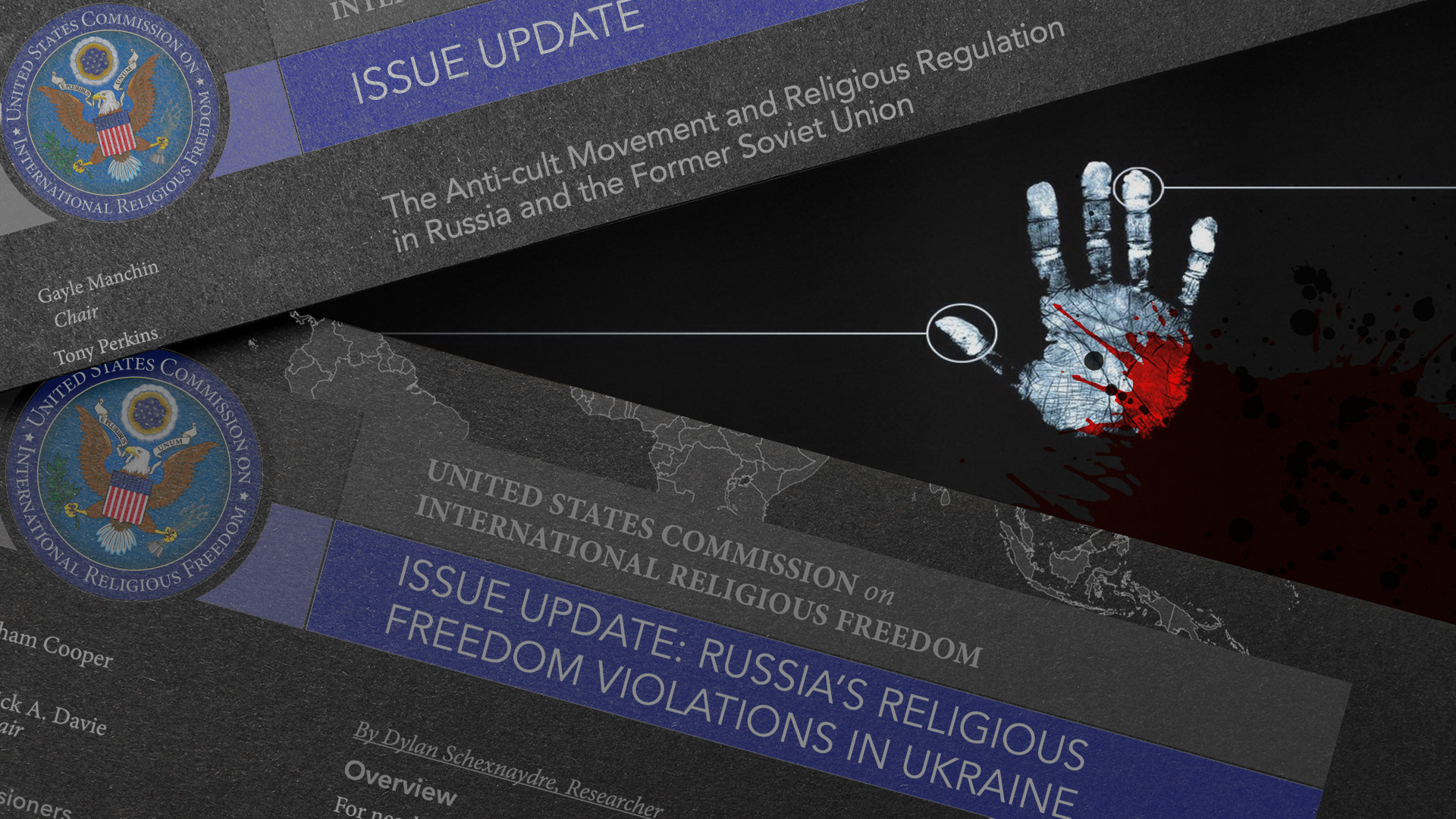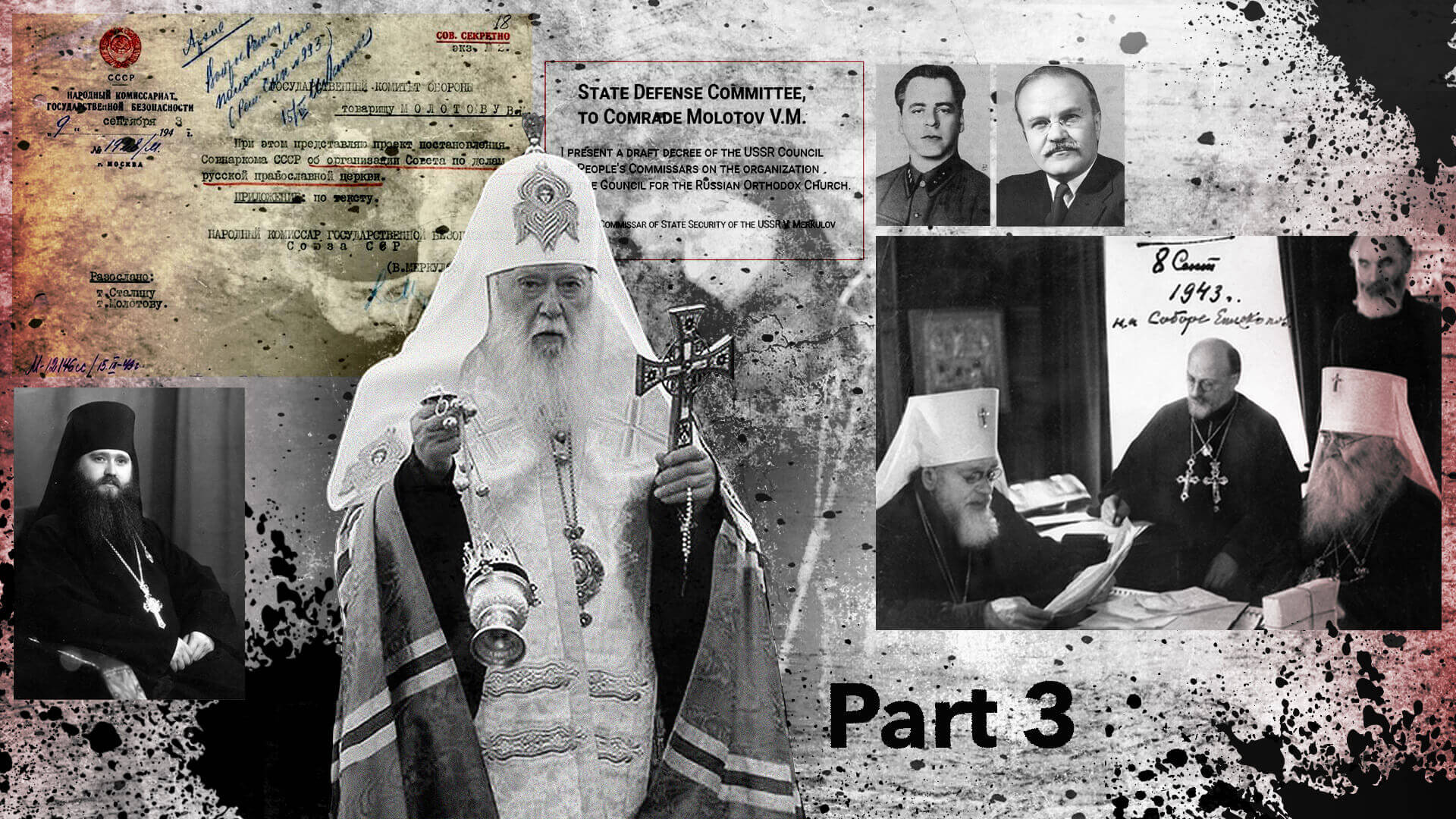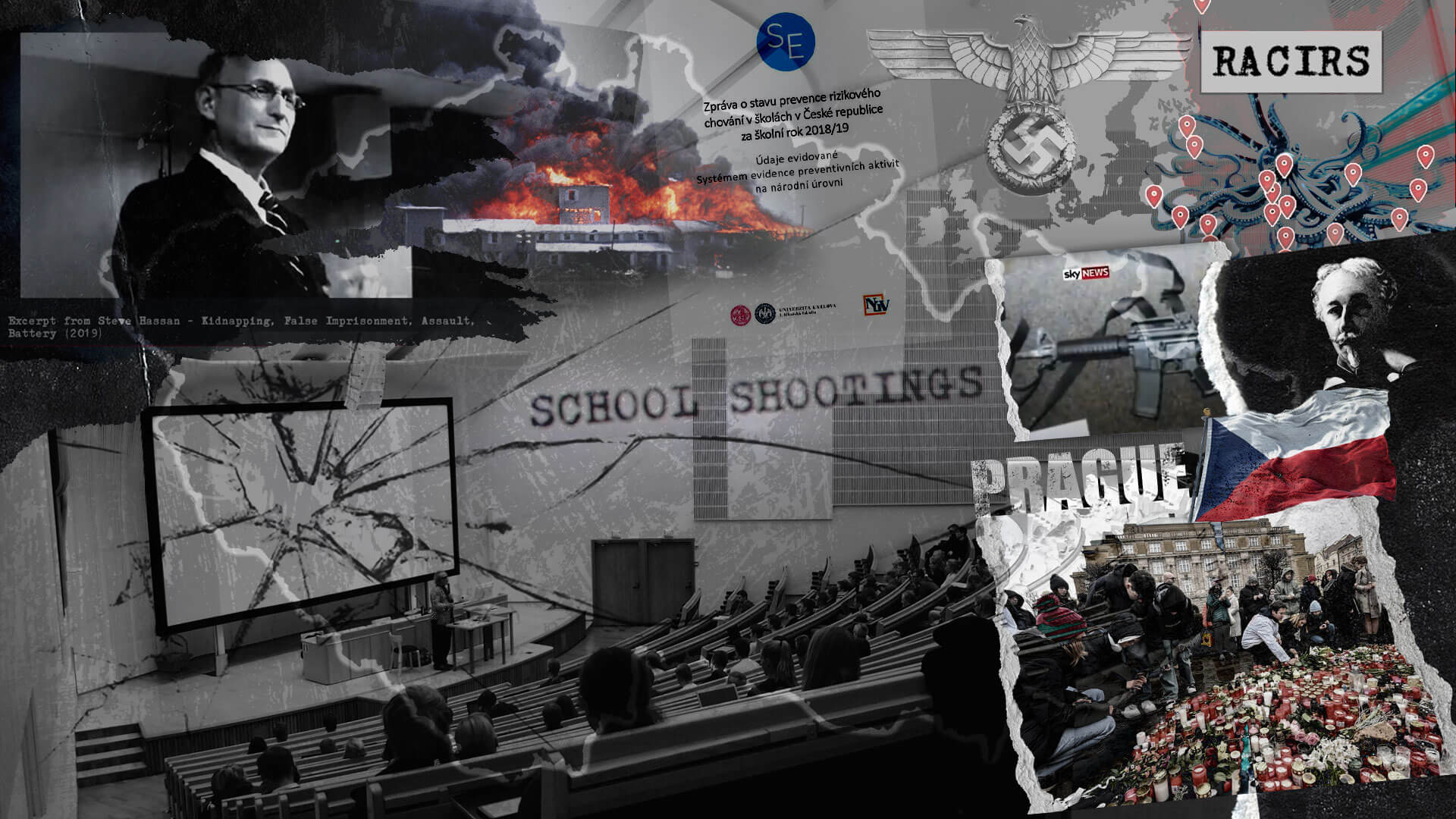Emergence and Development of Anti-Cultism in Russia. How Its Activities and Rhetoric Has Influenced and Keeps Influencing the Russian Supreme Government Bodies and Contributes to Justifying Russia’s Aggression in Ukraine
Excerpts from the 2020 Report of the U.S. Commission on INTERNATIONAL RELIGIOUS FREEDOM “The Anti-Cult Movement and Religious Regulation in Russia and the Former Soviet Union” 1
“Alexander Dvorkin, a Russian anti-cult activist, had spent years lobbying for strong measures against groups he frequently refers to as ‘totalitarian cults’ and ‘destructive sects’”
“The anti-cult movement, an international network supported locally by the ROC, the government, and concerned citizens, unites all these factors.”
“Dvorkin brought many anti-cult ideas with him when he returned to a newly-independent Russia in 1992 to work at the ROC’s new Department of Religious Education. He arrived in Moscow with a Ph.D. in Medieval Studies and began organizing a Russian anti-cult movement.”


“In 1993, Dvorkin founded the Saint Irenaeus of Leon Information- Consultation Center (SILIC) under the auspices of the ROC and with the blessing of then Patriarch Alexey II. Almost 30 years later, SILIC remains the propaganda center of the anti-cult movement in Russia and maintains an online database of NRMs, as well as an archive of writings.”
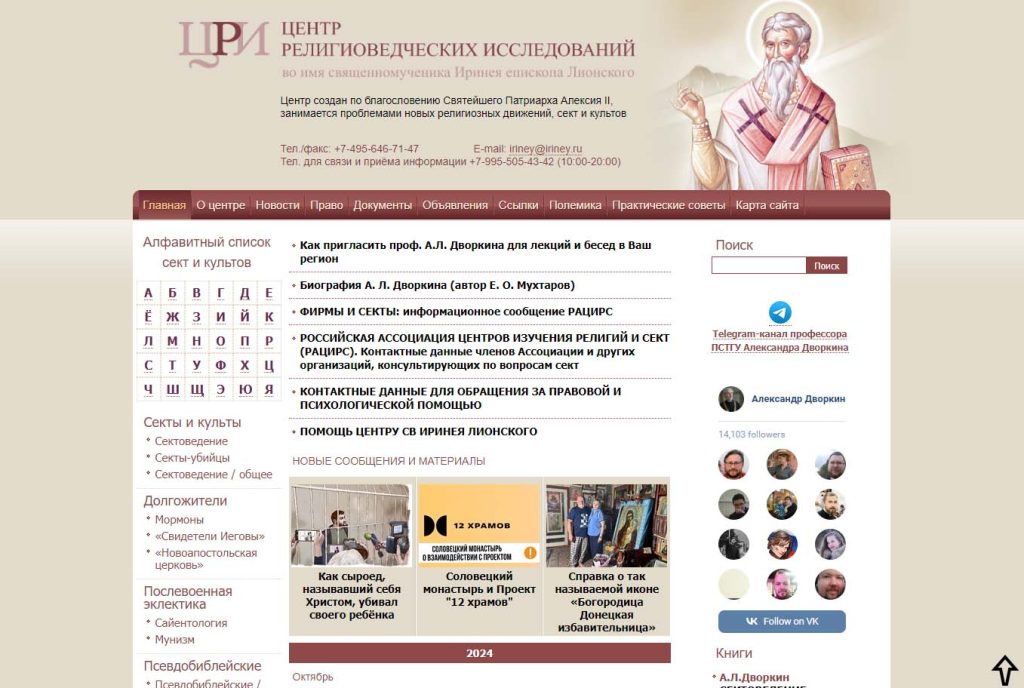
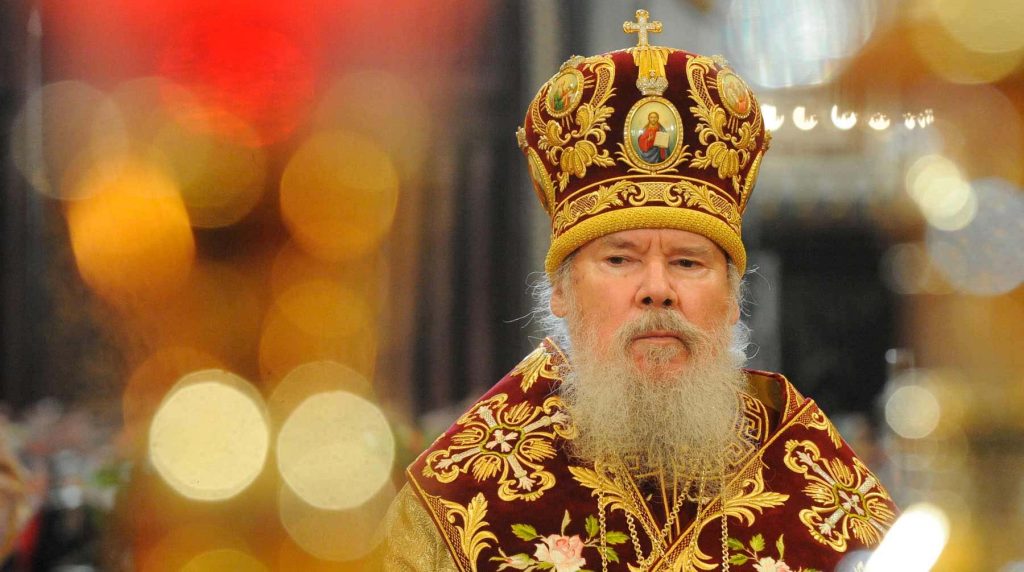
“Dvorkin has long provided the anti-cult movement with a veneer of intellectual credibility. Since 1999, he has taught Sectarian Studies at the ROC’s University of St. Tikhon; yet, his degree in Medieval Studies provides no academic grounding in religious studies or the sociological and psychological concepts on which he so frequently relies. At a seminar in 1993, he allegedly coined the term ‘totalitarian sect,’”
“Such jargon, alongside other favorite terms like ‘destructive cult’ or the prefix ‘pseudo’ (as in pseudo-Christianity or pseudo-religion), reveals the anti-cult movement’s pretension to standing as the final arbiter of religious truth.”
“On September 26, 1997, the Russian Federation passed Federal Law No. 125-FZ, On Freedom of Conscience and Religious Associations, which ended the state’s permissive treatment of religious minorities and introduced regulations based on previous Soviet policy.”
“The law was effectively designed to bolster established faiths and limit the spread of NRMs. The preamble acknowledged ‘the special role of Orthodoxy in the history of Russia and in the establishment and development of its spirituality and culture’ as well as that of traditional religions like Islam, Buddhism, and Judaism, which constituted ‘an integral part of the historical heritage of the peoples of Russia.’”

“The rhetoric of the anti-cult movement and the Russian state have converged noticeably over the subsequent decade. Echoing Putin’s concerns about spiritual and moral security, Dvorkin claimed 7 in 2007 that NRMs deliberately ‘inflict damage on Russian patriotic feelings.’”
“In 2010, he gave a lecture entitled ‘Totalitarian Sects as a Threat to National Security” to students at the Institute of the Federal Security Bureau (FSB)—the main successor to the Soviet-era KGB. In 2012, Putin claimed 8 that ‘totalitarian sects’ were ‘growing like mushrooms,’ and ‘present[ed] a distinct threat to society’ that needed to be addressed by legal mechanisms at both the local and federal levels.”
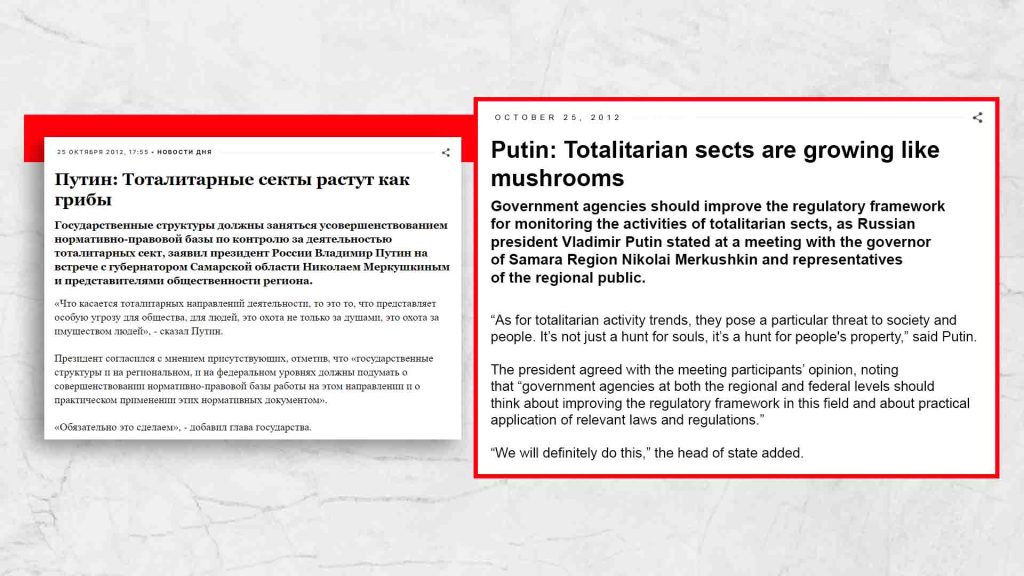
“In July 2016, the Russian government adopted a package of amendments, commonly known as the Yarovaya Law, which significantly enhanced the scope and penalties of previous religion and anti-extremism laws. The law characterizes sharing religious faith, or extending invitations to religious services, as illegal missionary activity if it occurs outside of officially registered spaces (including in private homes or over the internet). The law enables the government to monitor private electronic communications in what observers characterized as a direct ‘echo [of] the sweeping powers wielded by the KGB.’”
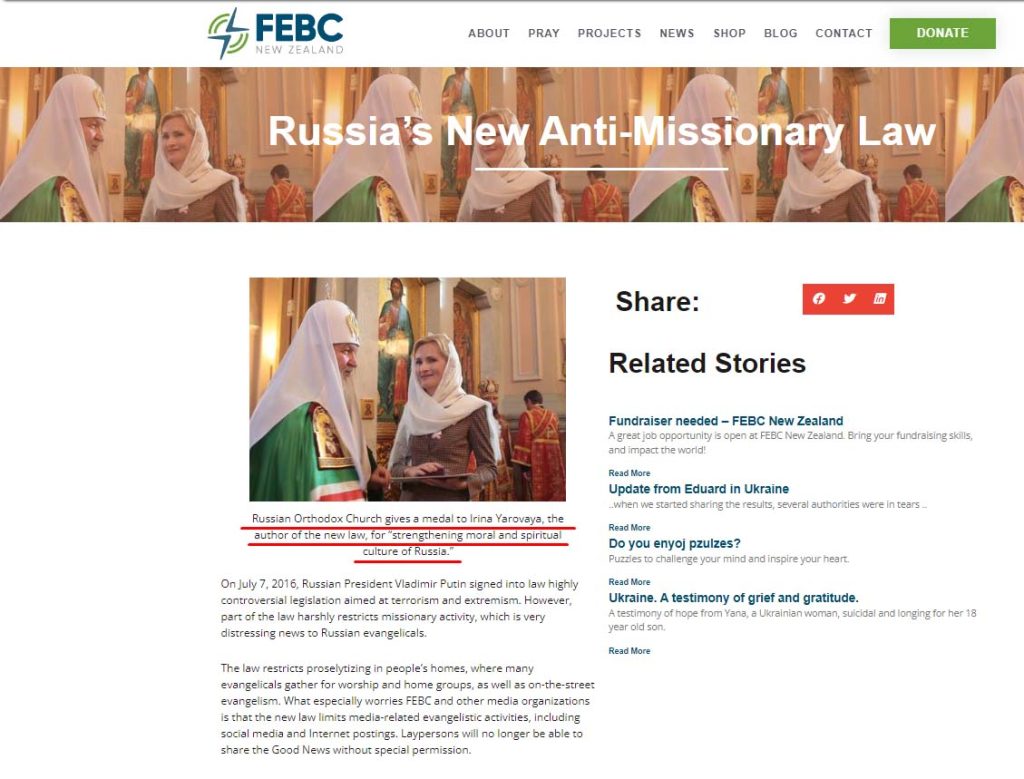
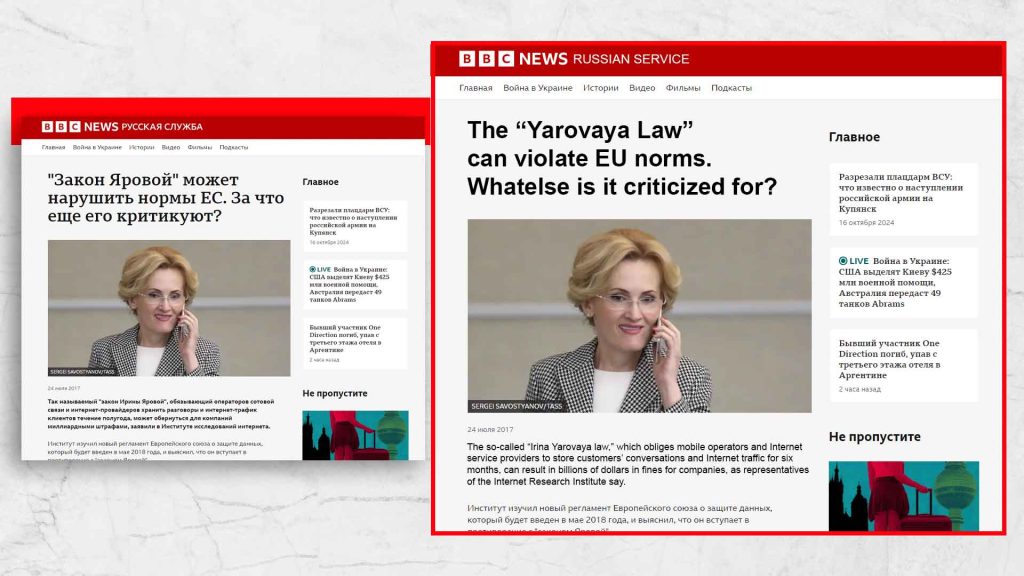
“On April 20, 2017, Jehovah’s Witnesses became the first religion to be banned outright across Russia, based on the accusation that the church was an ‘extremist organization.’“
“Since that time, hundreds of Jehovah’s Witnesses have been subjected to raids, investigations, imprisonment, and even torture. In a press statement released one day after the ban, Dvorkin and the anti-cult movement welcomed the decision 13 as ‘a significant step towards defending the rights of all citizens of Russia and the Former Soviet Union.’”
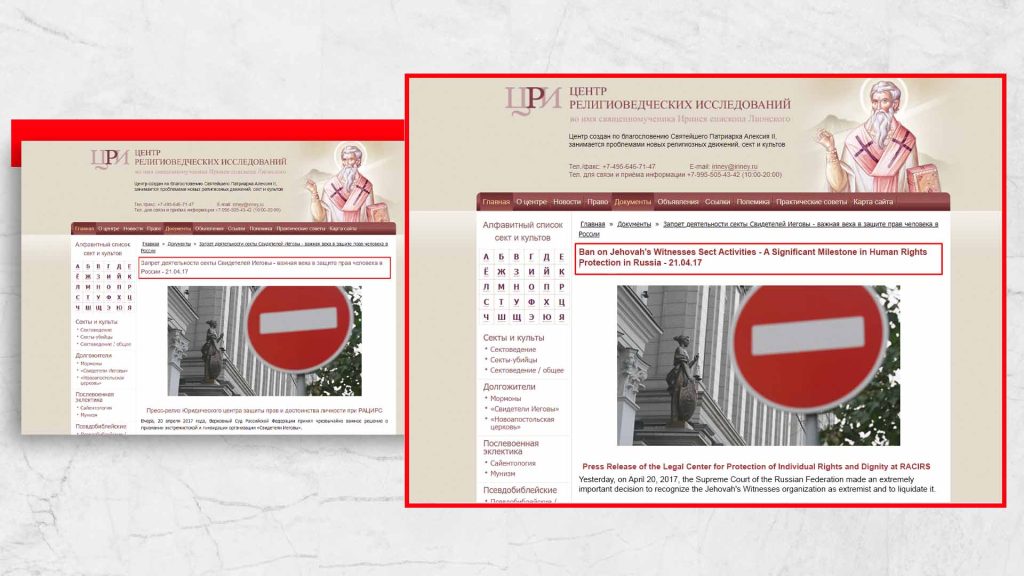

“Dvorkin’s influence has also extended outside of the post-Soviet orbit. In 2009, the same year in which he was appointed head of Russia’s Council of Experts, he also became Vice-President of the European Federation of Research and Information Centers on Sectarianism (FECRIS), a French anti-cult organization with pan- European influence. The French government provides the majority of FECRIS’ funding and the group regularly spreads negative propaganda about religious minorities, including at international forums like the annual Organization for Security and Cooperation in Europe (OSCE) Human Dimensions conference. Dvorkin’s SILIC is the primary associate of FECRIS in Russia and receives significant financial support from both the ROC and the Russian government.”
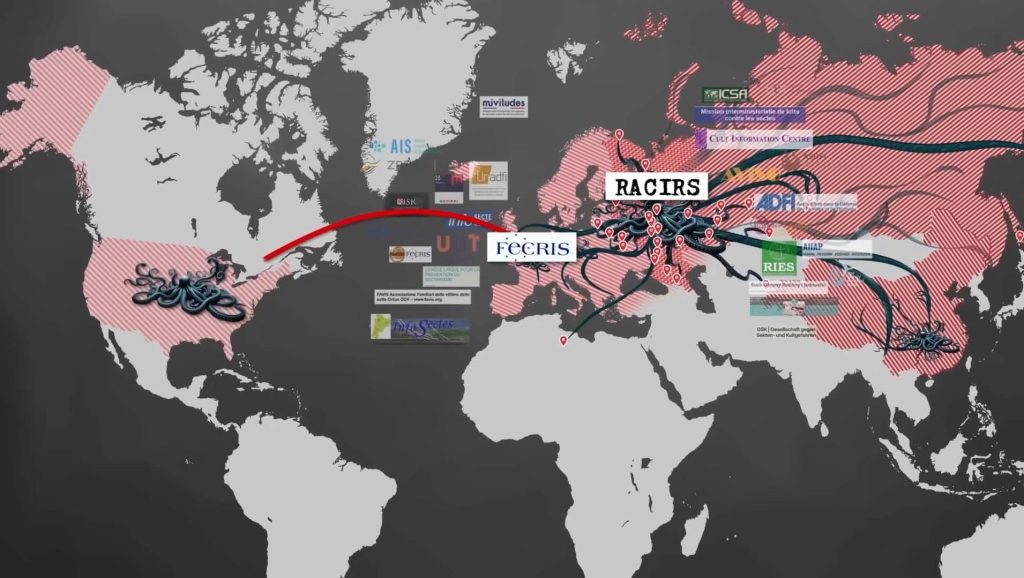
On the Expansion of Anti-Cult Activities into Ukraine:
“Exporting Intolerance to Ukraine. Russia brought along its restrictive religious regulation framework when it invaded Crimea in 2014, including the symbiosis between anti-cult ideas and national security. The occupation regime in Ukraine frequently has used religious regulations to terrorize the general population as well as to target activists in the Crimean Tatar community, the majority of whom are Muslim, and charge them with extremism and terrorism. Occupation authorities routinely arrest Crimean Tatars on such charges—usually for alleged membership in either Tablighi Jamaat (JT) or Hizb ut-Tahrir (HT), both of which are legal in Ukraine, but banned in Russia. In the Russian Federation, alleged membership in HT is frequently used as sufficient cause for charges of terrorism, even without evidence of any actual or planned violence. Merely meeting to pray and discuss Islamic philosophy can result in multi-year prison sentences.”
“Since the Russian invasion, the larger Muslim community in occupied Crimea has faced persistent harassment.”
“The anti-cult movement has had exceptional impact on religious regulation in the FSU, helping to raise the profile of ROC concerns about the spread of NRMs to the level of a regional approach to so-called “spiritual security.” It draws on fears about the shared totalitarian past to justify the imposition of repressive regulations derived from it, trampling on basic rights while simultaneously claiming to defend them. Alexander Dvorkin and his associates have carved out influential roles in government and society, shaping the public discourse on religion across numerous countries. Claiming to be experts in academic fields like religious studies, psychology, and sociology, they are rarely qualified in any of them and often rely on discredited theories and methodologies to promote their ideological agenda. The official prominence of the anti-cult movement has coincided with, and arguably helped to facilitate, the official fortunes of the ROC.”
“The anti-cult movement is fundamentally a propaganda outlet conducting a highly effective information war against religious minorities throughout Russia and many of the countries in which it retains influence.”

Excerpts from the 2023 Report of the U.S. Commission on INTERNATIONAL RELIGIOUS FREEDOM “ISSUE UPDATE: RUSSIA’S RELIGIOUS FREEDOM VIOLATIONS IN UKRAINE” 15 that sheds light on the consequences of the impact of anti-cult activities originated in Russia (as described in the 2020 report of the U.S. Commission on International Religious Freedom) on the territory of Ukraine
“In the years following, Russian-installed authorities in Crimea and Donbas imposed repressive Russian laws that severely curtailed religious freedom and targeted religious minorities. Officials banned religious literature and prohibited certain forms of religious activities and speech. They also outlawed entire religious groups either by depriving them of legal registration or declaring them ‘extremist’ or ‘terrorist,’ despite the fact they had peacefully and legally practiced their religion in Ukraine for years.
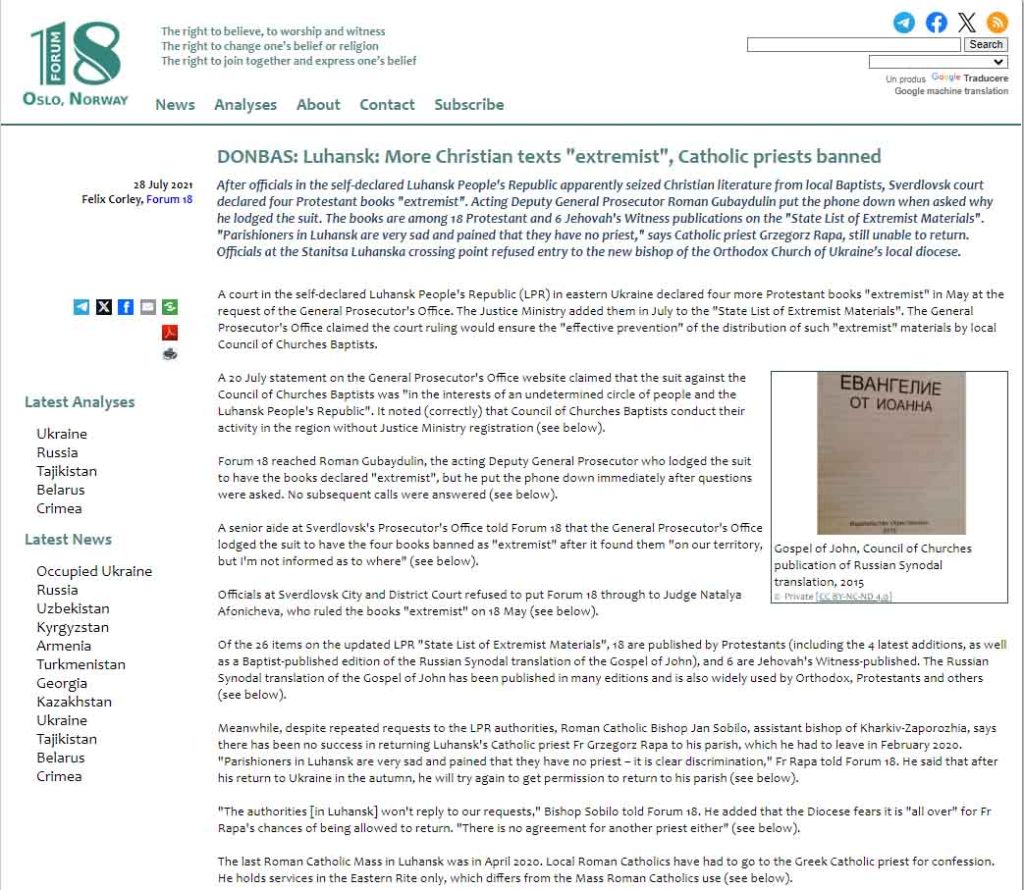
Since Russia launched its full-scale invasion of Ukraine on February 24, 2022, its military has dismantled religious life and stifled religious diversity throughout other parts of Ukraine. On the frontlines of the war, Russian artillery and military forces frequently damaged and destroyed religious buildings and other sites and killed or injured those sheltering or worshiping in these places. In areas under Russian control, de-facto authorities have abducted and tortured religious leaders and enforced the same repressive Russian legal mechanisms that were instituted in Crimea and Donbas. Furthermore, official Russian state discourse justifying and supporting the war has frequently resorted to rhetoric demonizing Jews, distorting the Holocaust, denigrating ‘non-traditional’ religious groups and the LGBTQI+ community, and characterizing Russia’s unprovoked war of aggression in Ukraine as justified based on religion.”
“Since the occupation, Russian de-facto authorities have enforced Russia’s religiously repressive legal system that punishes independent religious activities and targets disfavored religious groups.”
“Russia’s extremism law grants courts broad autonomy to determine whether literature or groups are ‘extremist,’ therefore subjecting them to and various legal sanctions including literature bans, liquidation, financial blacklisting, or imprisonment of members who engage in the organization’s activities. The law fails to clearly define ‘extremism,’ and the use of or advocacy for violence is not a prerequisite to be declared extremist, paving the way for authorities to prosecute virtually any activity or speech they consider problematic. Since the Russian Supreme Court declared Jehovah’s Witnesses extremist in 2017, Crimean Jehovah’s Witnesses have faced unjust prosecution for their peaceful religious activities. In December 2022, a court in Armyansk sentenced 17 two Jehovah’s Witnesses to six years in prison for discussing the Bible over Zoom among other peaceful religious activities. In February 2023, the Yalta City Court sentenced three Jehovah’s Witnesses to between six and six-and-a-half years in prison and another Jehovah’s Witness to three years’ suspended imprisonment for their religious beliefs. As of March, Russian de-facto courts in occupied Crimea have sentenced 12 Jehovah’s Witnesses to imprisonment and two to suspended imprisonment, with five still under investigation.” 18

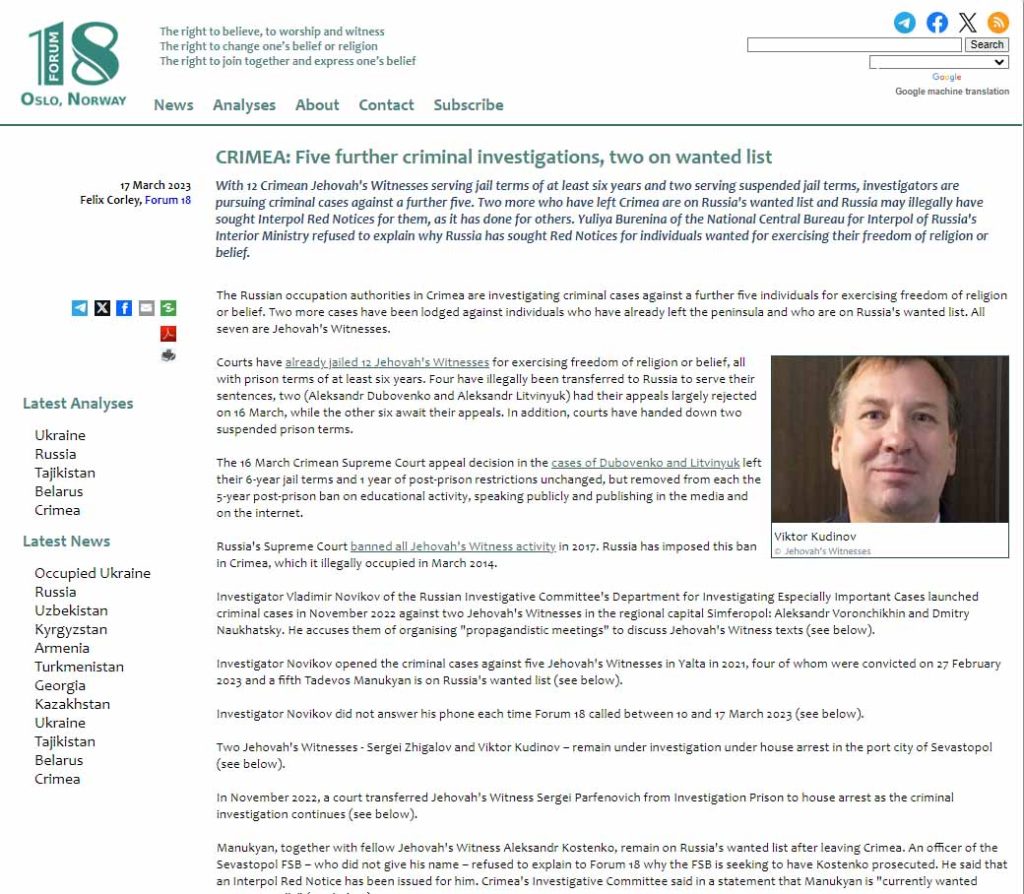
“Russian officials have dismantled Crimean Tatar institutions, subjected the community and its allies to harassment and intimidation, and arrested dozens of Crimean Tatar activists, journalists, and other civil society actors on the basis of their religious identity, religious activity, or alleged affiliation with Hizb-ut-Tahrir (HT), which is legal in Ukraine but banned in Russia. Since the Russian Supreme Court declared HT a terrorist organization in 2003, Muslims in Russia accused of belonging to HT have faced unsubstantiated terrorism and other charges related to their religious affiliation or activities, despite no evidence the defendants participated in, called for, or planned violence.
In February 2022, Federal Security Service (FSB) officers searched the homes of four Crimean Tatar activists and detained them for alleged HT activities, which included organizing and participating in meetings and discussing religion and politics. Court subsequently sentenced Marlen Mustafayev to 17 years’ imprisonment in November, Ametkhan Abdulvapov to ten years and six months’ imprisonment in March, Ernest Seytosmanov to 18 years’ imprisonment in May, and Ansar Osmanov to 20 years’ imprisonment in June.”
“Over the course of 2022 and early 2023, the Southern District Military Court sentenced a group of 20 Crimean Tatar activists who were arrested together in 2019 to prison terms ranging from 12 to 19 years for alleged HT affiliation. At the time of their arrests,authorities reportedly planted and subsequently ‘found’ HT materials during searches of their homes.”

“In January, the Southern Military District Court sentenced Crimean Tatar cleric and activist Raif Fevziyev to 17 years in prison, and in May, the court sentenced Dzhebbar Bekirov to 17 years in prison and Zavur Abdullayev, Rustem Murasov, and Rustem Tairov to 12 years in prison each. All five had been arrested in August 2021 and accused of being involved in HT. Prosecutors used recordings of the defendants discussing religious issues as evidence during trial, with at least one of the recordings dating back to December 2015. In May, the Southern Military District Court sentenced Oleksandr Sizikov, who is legally blind, to 17 years in prison and Seiran Khairedinov and Alim Sufianov to 12 years in prison each for alleged HT activities, which included possessing religious literature and discussing religion and politics.”
“Imprisoned Crimean Tatars reported medical neglect, being served food violating their religious dietary requirements, Qur’an confiscations, and inhumane living conditions, including rat-infested cells and a lack of access to beds, clean water, and sanitary toilet facilities. In February, Dzhemil Gafarov died in prison after experiencing chest pain, difficulty breathing, and severe headaches. Prison authorities rejected his January request to transfer to a hospital and had allegedly denied him medical care repeatedly over the years, despite his preexisting health conditions. In April, authorities took into custody Amet Suleymanov to begin serving his sentence, despite his serious heart issues. Authorities had placed Suleymanov under house arrest in March 2020 after accusing him of HT membership, and in October 2021, the Southern Military District Court sentenced him to 12 years in prison.”
“In July 2022, men in military uniform in Lysychansk, Luhansk, reportedly seized the city’s largest Protestant church, cleared out all the belongings, and turned it into a military administration building. That same month, they seized another Protestant church and reportedly told church members that the military administration has banned Baptists, Pentecostals, and Seventh-day Adventists as ‘extremists.’”
“It was reported in February that Russian de-facto authorities in Mariupol had banned ‘all Protestant and non-Orthodox churches’ as well as non Orthodox holidays.”
“Among these gross human rights violations and potential war crimes, Russian forces have damaged places of worship and targeted religious leaders because of their religious leadership roles. Russian military personnel have consistently threatened, exiled, detained, disappeared, tortured, and killed religious figures in order to exert control and influence over local populations. More than 30 religious figures, including pastors, priests, deacons, hieromonks, monks, nuns, and military chaplains, have reportedly been killed since the invasion. Religion on Fire, a Ukrainian project documenting the war’s impacts on religious communities, reported at least 20 religious figures killed and another 15 kidnapped in the first six months of the war.
In March 2022, Russian soldiers in Kherson abducted OCU priest Sergey Chudinovich after he refused to allow Russian soldiers to distribute aid at his church. Russian forces kept him in a cold basement without proper clothing and beat, strangled, and attempted to rape him with a baton until he agreed to cooperate with them.
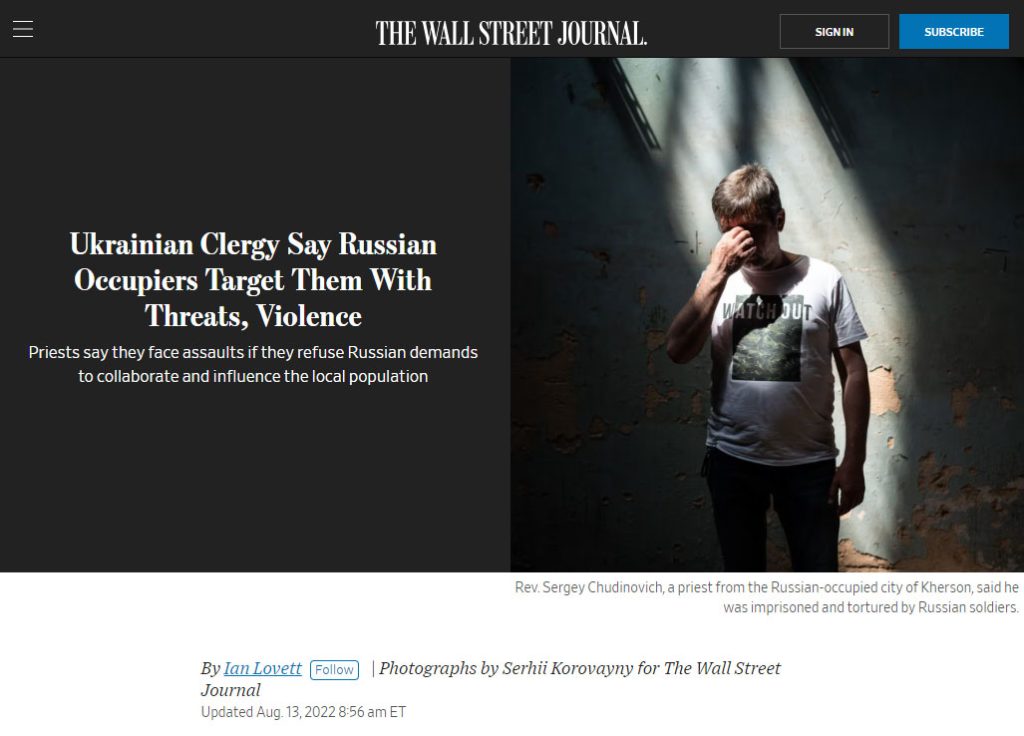

In March 2022, Russian forces detained Crimean Tatar Imam Rustem Asanov at a checkpoint in the Kherson region. They kept him in a basement where they tightened the handcuffs on his hands to the point of physical pain, suffocated him until he lost consciousness, and beat him. After releasing Asanov, Russian forces raided his mosque and confiscated religious materials they deemed ‘extremist.’ In another incident, the UN Independent International Commission of Inquiry on Ukraine found that Russian soldiers in an unidentified region stripped a priest of his clothes, beat him, and ordered him to parade around naked in the streets of his village.”
“In November, Russian forces in Nova Kakhovka, Kherson, abducted Evangelical deacon Anatoliy Prokopchuk and his son Oleksandr Prokopchuk for unclear reasons. Days later, the two were found dead with signs of severe torture on their bodies in a forest near the city.”
“Since the start of the invasion, the United Nations Educational, Scientific, and Cultural Organization (UNESCO) has verified damage to at least 112 religious sites. Religion on Fire reported at least 450 religious buildings—including chapels, churches, prayer houses, roadside crosses, kingdom halls, synagogues, mosques, memorials, monasteries, and religious educational institutions—were damaged or destroyed a year after the invasion, with the Ukrainian Institute for Religious Freedom reporting nearly 500 religious buildings and sites damaged or destroyed as of January 2023.”
“Between March and November 2022 in Kherson, Russian soldiers seized the Protestant Tavriski Christian Institute, burned its library, and used its facilities as a military base and crematorium for Russian soldiers killed in combat. Russian soldiers pejoratively referred to employees of the institute as ‘sectarians’ because of their Protestant religious beliefs and cited those beliefs as reasons to seize the institute.”

How Russian Officials and Pro-Kremlin Military Propaganda Use Religious Language to Justify the Invasion of Ukraine.
“Russian Justifications for the War.
Russian officials and pro-Kremlin war propaganda 22 have justified the invasion of Ukraine with religious language, hateful speech, and distorted historical references at the expense of religious and other minority communities. When President Vladimir Putin announced 23 Russia’s ‘special military operation’ in Ukraine, he made unfounded comparisons of Ukrainian government officials with far-right nationalists and neo-Nazis. President Putin furthermore said the so-called special military operation would aim to ‘demilitarize and denazify Ukraine’ to stop what he falsely called a ‘genocide’ against Russians and Russian-speaking citizens in the country. While there was no supporting evidence to back President Putin’s claims, his repeated references to Nazis and World War II have served 24 as a tactic to rally domestic support for the invasion by playing on Russian society’s collective memory about the war and Russian suffering caused by Nazi Germany.
Russian narratives about World War II have always been Russian-centric; however, these narratives have often omitted facts or distorted history related to the Nazis’ systematic, genocidal campaign targeting Jews.
When employing denazification rhetoric, high-ranking Russian government officials and representatives have frequently engaged in blatant antisemitism and Holocaust distortion as they tried to delegitimize the Jewishness of Ukrainian President Volodymyr Zelenskyy, who is Jewish and lost family members in the Holocaust. When a journalist questioned Russian Foreign Minister Sergey Lavrov about the seeming contradictions of ‘denazifying’ a country by removing its Jewish leader, Foreign Minister Lavrov speculated 25 that Hitler ‘had Jewish blood, too’ and added that ‘wise Jewish people say that the most ardent anti-Semites are usually Jews.’
This statement coupled with denazification rhetoric perpetuated the antisemitic idea that Jews brought the Holocaust upon themselves. Additionally, in November the Russian Embassy in the United Kingdom posted 26, in a now deleted Tweet, a meme that featured an antisemitic caricature of President Zelenskyy. Russian propagandists on state channels have also referred 27 to Zelenskyy as the ‘Antichrist.’ In addition to antisemitism targeting President Zelenskyy, Foreign Minister Lavrov engaged 28 in Holocaust distortion most recently in January by invoking the Holocaust and Hitler to argue that Western countries were seeking to eradicate Russia and Russians just as ‘Hitler wanted a “final solution” to the Jewish question.’
Denazification rhetoric moreover stood in stark contrast with Russian military actions impacting Ukrainian Jews and Holocaust memorials. In March 2022, a week after the outbreak of the war, Russian missiles damaged the grounds of the Babyn Yar Holocaust Memorial Center in Kyiv which memorializes the site where 33,000 Jews were murdered by the Nazis in the span of two days in 1941. That same month, Russian artillery reportedly damaged a menorah at the Drobitsky Yar Holocaust memorial complex in Kharkhiv which memorializes a site where 15,000 Jews were killed. Relatedly, Russia’s offensive has led to the deaths of at least two Holocaust survivors: Boris Romantschenko and Vanda Semyonovna Obiedkova. In addition to denazification, Russian pro-war discourse has depicted 29 the war as a fight against ‘satanism.’ In some instances, ‘satanism’ has appeared to refer to what the Russian state considers ‘non-traditional’ religious groups, including a Jewish religious movement. In October, then Assistant Secretary of the Security Council of Russia Alexei Pavlov argued 30 for the ‘desatanization’ of Ukraine, citing the degradation of traditional religious teachings and the flourishing of ‘neo-pagan cults.’ Pavlov specifically singled out as cults the Protestant Word of Life Church, Church of Scientology, Church of Satan, and Chabad Lubavitch 31, one of the largest Jewish religious groups in Russia and Ukraine. The concept of ‘desatanization’ in such instances condones the targeting and elimination of Ukraine’s flourishing religious diversity and seeks to legitimize yet another historical antisemitic trope.
Other high ranking Russian officials have depicted the invasion of Ukraine as a fight against ‘satanism’. Former president and deputy chairman of Russia’s Security Council Dmitry Medvedev characterized 32 the war as a ‘sacred’ battle, arguing that the purpose of the war was to “stop the supreme ruler of Hell, whatever name he uses—Satan, Lucifer or Iblis.” Chechen leader Ramzan Kadyrov has called 33 for a ‘jihad’ across all of Ukraine and went on to define 34 ‘satanism’ as ‘openly acting against Russia.’ President Putin has also framed 35 the war as a battle against the “radical denial of moral, religious, and family values” by Western elites and cited the “overthrow of faith and traditional values” as resembling “‘religion in reverse’—pure Satanism.” Such sentiments have been shared and amplified 36 by the Russian Orthodox Church under Patriarch Kirill, who has declared his vociferous support 37 for the invasion as a fight against sin and foreign pressure to hold ‘gay parades.’
Sources:
1. https://www.uscirf.gov/publication/anti-cult-movement-and-religious-regulation-russia-and-former-soviet-union
2. https://pstgu.ru/news/main/faculties/professor_a_l_dvorkin_vystupil_na_zasedanii_protivosektantskoy_sektsii_v_khrame_khrista_spasitelya/
3. https://pstgu.ru/news/main/sostoyalas_prezentatsiya_knigi_professora_pstgu_a_l_dvorkina/
4. https://iriney.ru/
5. https://dailystorm.ru/news/patriarh-aleksiy-ii-blagoslovil-shiigumen-sergiy-obyasnil-kak-stal-svyashchennikom-posle-tyurmy
6. https://nbra.ru/index.php?option=com_attachments&task=download&id=267
7. https://iriney.ru/main/dokumentyi/totalitarnyie-sektyi-nanosyat-ushherb-patrioticheskim-chuvstvam-rossiyan.html
8. https://vz.ru/news/2012/10/25/604291.html
9. https://vz.ru/news/2012/10/25/604291.html
10. https://www.rferl.org/a/russia-yarovaya-law-religious-freedom-restrictions/27852531.html
11. https://febc.nz/russias-new-anti-missionary-law/
12. https://www.bbc.com/russian/news-40703706
13. https://iriney.ru/main/dokumentyi/zapret-deyatelnosti-sektyi-svidetelej-iegovyi-vazhnaya-vexa-v-zashhite-prav-cheloveka-v-rossii.html
14. https://hudoc.echr.coe.int/eng#{%22tabview%22:[%22document%22],%22itemid%22:[%22001-217535%22
15. https://www.uscirf.gov/publications/russias-religious-freedom-violations-ukraine
16. https://www.forum18.org/archive.php?article_id=2675
17. https://khpg.org/en/1608811473
18. https://www.forum18.org/archive.php?article_id=2818
19. https://www.wsj.com/articles/ukrainian-clergy-say-russian-occupiers-target-them-with-threats-violence-11660377935
20. https://www.intoleranceagainstchristians.eu/index.php?id=12&case=5526
21. https://iriney.ru/main/prakticheskie-sovetyi/
22. https://www.nytimes.com/interactive/2022/07/02/world/europe/ukraine-nazis-russia-media.html?searchResultPosition=4
23. https://www.bloomberg.com/news/articles/2022-02-24/full-transcript-vladimir-putin-s-televised-address-to-russia-on-ukraine-feb-24
24. https://www.wsj.com/articles/in-russia-nazi-is-the-harshest-insult-for-any-foe-and-now-ukraine-11645897323
25. https://www.washingtonpost.com/history/2022/02/25/zelensky-family-jewish-holocaust/
26. https://archive.ph/yq32F#selection-2183.477-2183.759
27. https://www.jpost.com/international/article-723216
28. https://www.reuters.com/world/europe/russias-lavrov-likens-us-actions-those-hitler-napoleon-2023-01-18/
29. https://www.theguardian.com/world/2022/apr/21/ukrainian-holocaust-survivor-91-dies-during-mariupol-siege
30.https://www.state.gov/disarming-disinformation/disinformation-roulette-the-kremlins-year-of-lies-to-justify-an-unjustifiable-war/
31. https://www.jpost.com/diaspora/antisemitism/article-720658
32. https://www.reuters.com/world/europe/medvedev-says-russia-is-fighting-sacred-battle-against-satan-2022-11-04/
33. https://www.themoscowtimes.com/2022/10/26/kadyrov-calls-for-russian-jihadacross-all-of-ukraine-a79192
34. https://t.me/RKadyrov_95/3033
35. http://en.kremlin.ru/events/president/news/69465
36. https://www.washingtonpost.com/religion/2022/03/21/russia-ukraine-putin-kirill/
37. https://apnews.com/article/russia-ukraine-putin-religion-europe-moscow-0670305be2e010e02a4e195ced2b7523

